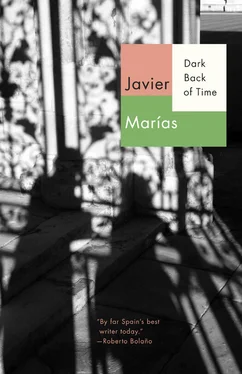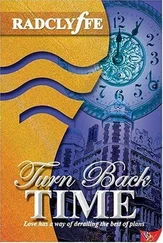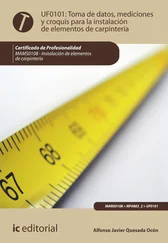It was after the book’s publication in England that the tempo of events and coincidences and confirmations I hadn’t sought began to accelerate, and it hasn’t yet slowed and may never stop, and I sometimes have the feeling that you must be careful about what you make up and write down in books because occasionally it comes true. And if this rhythm never stops, as I foresee, it’s very possible that one part of my life — but only one part — will forever be determined and ruled by a fiction, or by what this novel has brought me so far and what it has yet to bring.
Before that, however, something quite remarkable — though more so for the man who wrote to me than for me — had already happened. A few days after November n, 1991, when it was dated, I received a letter from one Anthony Edkins who lived on Deronda Road in London. The letter said we had seen each other once in Madrid at the home of Alvaro Pombo, but very much in passing and I might not remember it (and indeed, I hardly remembered it, though my memory isn’t generally that bad). Now he had read — in Spanish, clearly— Todas las almas , and was stunned when he reached the chapter on John Gawsworth. “Gawsworth, whom I never met in person,” he wrote, “was the first editor who accepted one of my poems (just, it so happens, as I was about to set out on my first trip to Spain in 1951). At that time, he was editor-in-chief of the Poetry Review: he wrote me, by hand, a five-page letter. (I’ve just located and reread that letter, dated 13–3–51, from Shepperton in Middlesex, and I see that we appear to have had a phone conversation.)” While this was undeniably a great and almost an excessive coincidence, there was really nothing too extraordinary about it up to this point, given that Gawsworth, in the course of the tireless activities he engaged in before becoming vagrant and passive, must have known an infinity of people related to literature, novices and acclaimed authors alike. But the following paragraph of Edkins’ letter made his perplexity and even his fear (or mine on reading it) more understandable, that bearable, brief fear that comes over us when we see things fitting together unexpectedly and with too much precision, the fear that the world is more orderly than we like to believe, or that we are better at ordering it. “Subsequently you mention and reproduce,” Edkins went on, “Gawsworth’s death mask made by Oloff de Wet, someone I met that same summer in the Café Gijón in Madrid. I was having a rough time of it, and he kept me in ham sandwiches and Pernod for a week or more, in exchange for which I had to listen to his fantastical but fascinating stories.” And the letter ended amid exclamations: “So, there I was, last week, reading a novel by someone I knew — though very slightly — which presented me with two people who, though I’ve never in my life run across them again, were of great importance to me forty years ago!”
I had no doubts as to the authenticity of the letter or Edkins’ veracity, though anyone who had wanted to play a trick on me couldn’t have come up with a better one. In addition to the incredible coincidence, there were certain ironic details that might have induced some suspicion in a less trusting individual: not only had my correspondent had dealings with Gawsworth and with De Wet, but he had known them separately and had never established any link whatsoever between the two men, who were nevertheless united at Gawsworth’s death; his contact with both Gawsworth and De Wet had taken place in the same year, 1951, which was also the year when his lasting relationship with Spain began and when, as it happens, I was born in Madrid, not far from the Café Gijón, the place where De Wet protected and fed him for a week or more; finally, Edkins lived on an implausible street named Deronda, and though I know and knew then that Daniel Deronda is the title of a famous nineteenth-century English novel, the truth is that the name, in this context, seemed a mocking and facile anagram for Redonda, the Antillean island of which Gawsworth was king.
I answered him immediately, asking for a copy of the letter from the king without a kingdom, if he would be so kind as to send me one; I told him that until then the only thing I had known about Oloff de Wet was his name, which appears as “Hugh Olaff de Wet” in the commemorative pamphlet on Gawsworth’s death from which I took the photograph of his plaster death mask. “And if you have the time and don’t mind remembering out loud,” I added, “I’d like to know more about De Wet, what kind of man he was, what sort of work he did, what type of ‘fantastical but fascinating stories’ he used to tell, how old he was and what it was that had set him adrift in Madrid at that point.” Since the publication of All Souls , I told him, a few more diverse facts about Gawsworth had reached me, but this was the first time I had received word from someone who had been in more or less direct contact with him. When I think of that observation, I can’t suppress a quick internal laugh, given all the things that have changed in that respect in the little more than six years since I read Edkins’ letter, and having in my house, as I now do, what I’ve grown used to calling “Gawsworth’s room.”
Edkins’ generous response is dated December 8. He sent me the requested photocopy of the letter. “As for Oloff de Wet, well …,” he wrote, “I could spend hours talking about him, though I was in contact with him for only a week; later I met two people who had known him: one, a very famous second-hand bookseller here in London, Bernard Stone (perhaps you know him), and the other, like Oloff himself, one of the first mercenary pilots, an American named Jim Tuck, who died a couple of years ago.… In 1951, De Wet was about thirty-eight; it was his first visit to Spain since the Civil War, when he had fought on the side of the Republic (having been rejected by Franco’s camp, probably because he had previously flown for Haile Selassie against Mussolini in the war of Abyssinia), with which, nevertheless, he was later in conflict; he only escaped being executed in Valencia through the personal intervention of Cisneros.” (Edkins was referring to Ignacio Hidalgo de Cisneros, commander of the Republican air force.) “He later worked for the Deuxième Bureau and the Germans arrested him in Prague, so he spent the entire war in a cellblock for men condemned to death … He published two books (and some childrens’ books as well, I believe). The first, about his aerial escapades during the Spanish Civil War, entitled Cardboard Crucifix ” (a horrible title if ever one existed), “was published by Blackwood in 1938 and in America by Doubleday as The Patrol Is Ended; I’ve never managed to get my hands on a copy of that book or read it; Bernard Stone promised to loan it to me but never kept his promise. It was from Stone that I learned Oloff had died, in the early 1970s, he thought. The second book is The Valley of the Shadow , Blackwood, 1949, with a paperback reprint in 1956, which is the version I have, about his German experience; the promotional copy on the cover indicates that he had appeared on the BBC television program This Is Your Life , so he couldn’t have been a complete unknown at that point! There was a time when I intended to write a comic novel, with Oloff as protagonist, but reading his book about the cell on death row put me off it.…” He then proposed that we see each other the next time he came to Madrid, which would probably be around Easter; he would tell me more then. He also suggested I ask Pombo for the manuscript of another unfinished novel of his which incorporated episodes from the abandoned project inspired by De Wet. He could be recognized beneath the name and mask of the character named Hugo van Renssaler.… But Pombo had almost certainly misplaced it, as he had done on other occasions.
Читать дальше












